Welcome to our article on the Irish Wolfhound lifespan! If you’re curious about how long these majestic dogs live, you’ve come to the right place. Let’s explore their average lifespan and factors that can impact it.
About Irish Wolfhounds
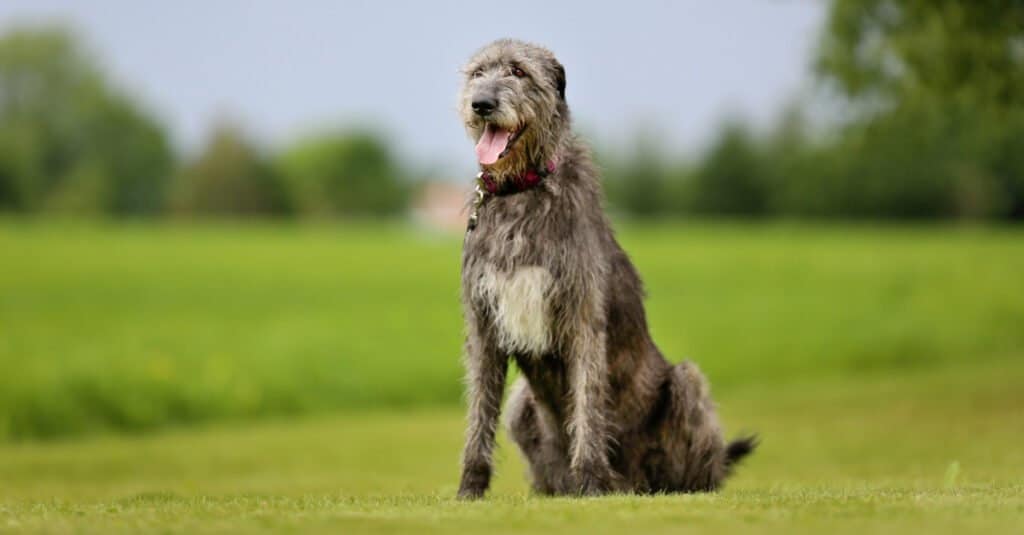
Did you know that the Irish wolfhound is the tallest dog recognized by the AKC?
©iStock.com/Bigandt_Photography
The Irish wolfhound is a large and powerful breed of dog. They stand at an impressive height of 32-34 inches tall at the shoulder for males and 28-30 inches tall for females. Wolfhounds typically weigh between 120-180 pounds for males and 105-140 pounds for females. They have long, muscular legs and a deep chest, and their distinctive coat comes in a variety of colors, including grey, red, brindle, black, white, and fawn. Irish wolfhounds have long, shaggy fur that can be wavy or straight. They have a long, narrow head with a large, black nose and long, droopy ears. Irish wolfhounds have big, warm hearts and are extremely loyal and affectionate.
Irish Wolfhound Lifespan
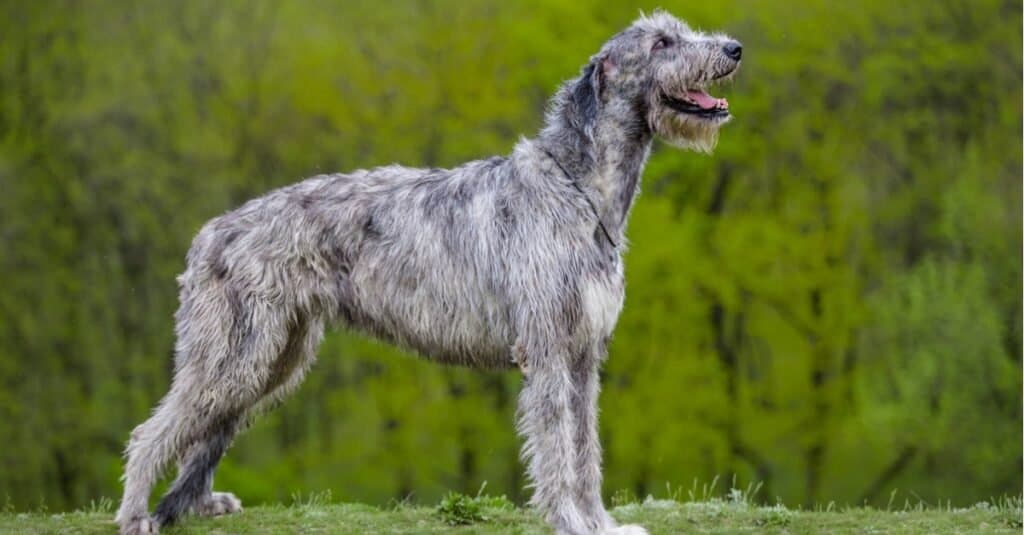
Six to ten years is the Irish wolfhound’s lifespan, on average.
©iStock.com/Ashva
The Irish wolfhound is a large and majestic canine breed, and with proper care and nutrition, they can live an average lifespan of 6-10 years. However, there are a few factors that can significantly affect their lifespan.
There are many factors that affect the lifespan of a dog, including exercise, health care, and weight. We will go into these in a bit more detail below.
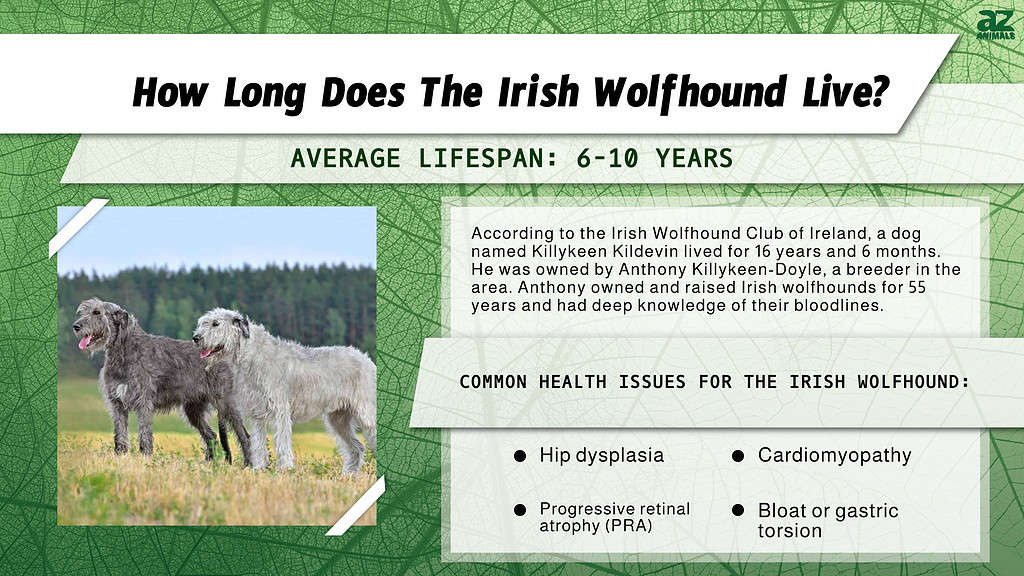
7 Factors That Affect Irish Wolfhound Lifespan
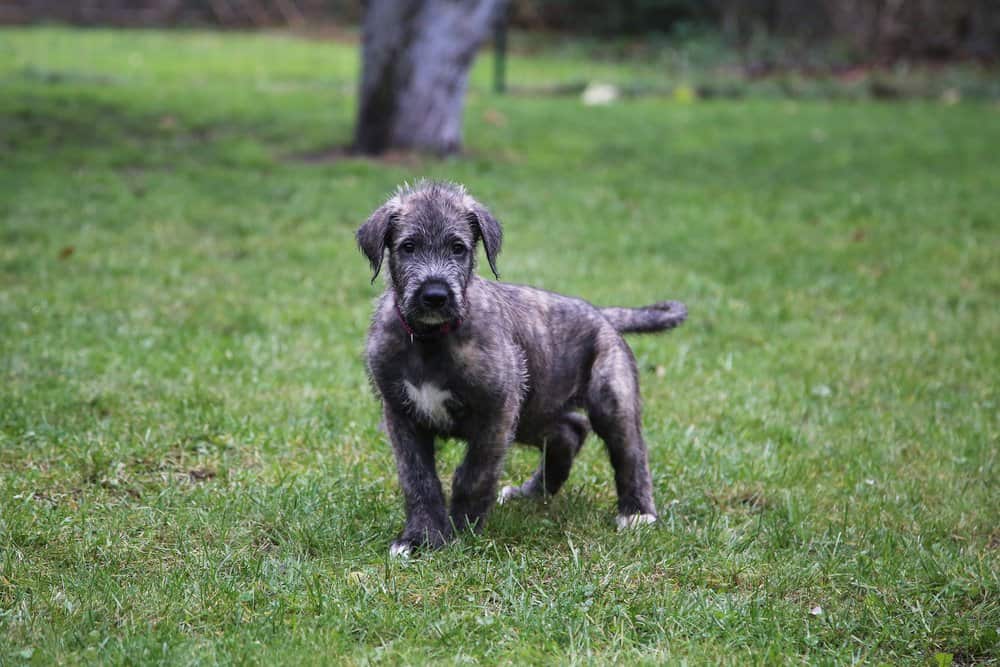
The oldest Irish wolfhound’s lifespan was 16 years!
©Jolanta Beinarovica/Shutterstock.com
1. Genetics
Genetic factors can influence the health of certain breeds or types of dogs, leading to conditions such as dysplasia, respiratory issues, or heart problems. Incorrect breeding practices may also lead to genetic defects.
It is not always apparent at a young age whether or not a pet has any medical conditions, and these may only become known as the animal matures. Pet owners should adjust their pets’ lifestyles if they are aware of any medical issues. For example, dogs with joint dysplasia issues should not partake in strenuous jumping or running but rather opt for easier walks or swimming instead.
2. Nutrition
It is true that “you are what you eat,” and the same goes for pets. Giving them the right kind of nutrition is key to helping them stay healthy and live their best life. Not providing them with the right nutrition while they are still growing can lead to joint issues, while being overfed can cause obesity, which can lead to health complications and a shorter lifespan.
Excessively energetic animals, those with health issues, puppies, and elderly dogs all have different dietary needs. Many pets may have hypersensitivities to specific types of nourishment, which regularly lead to skin and coat issues. Consult a veterinarian for advice on the best diet for your pet. Keeping a plentiful source of fresh water is likewise significant in keeping pets hydrated and healthy.
3. Exercise Increases Irish Wolfhound Lifespan
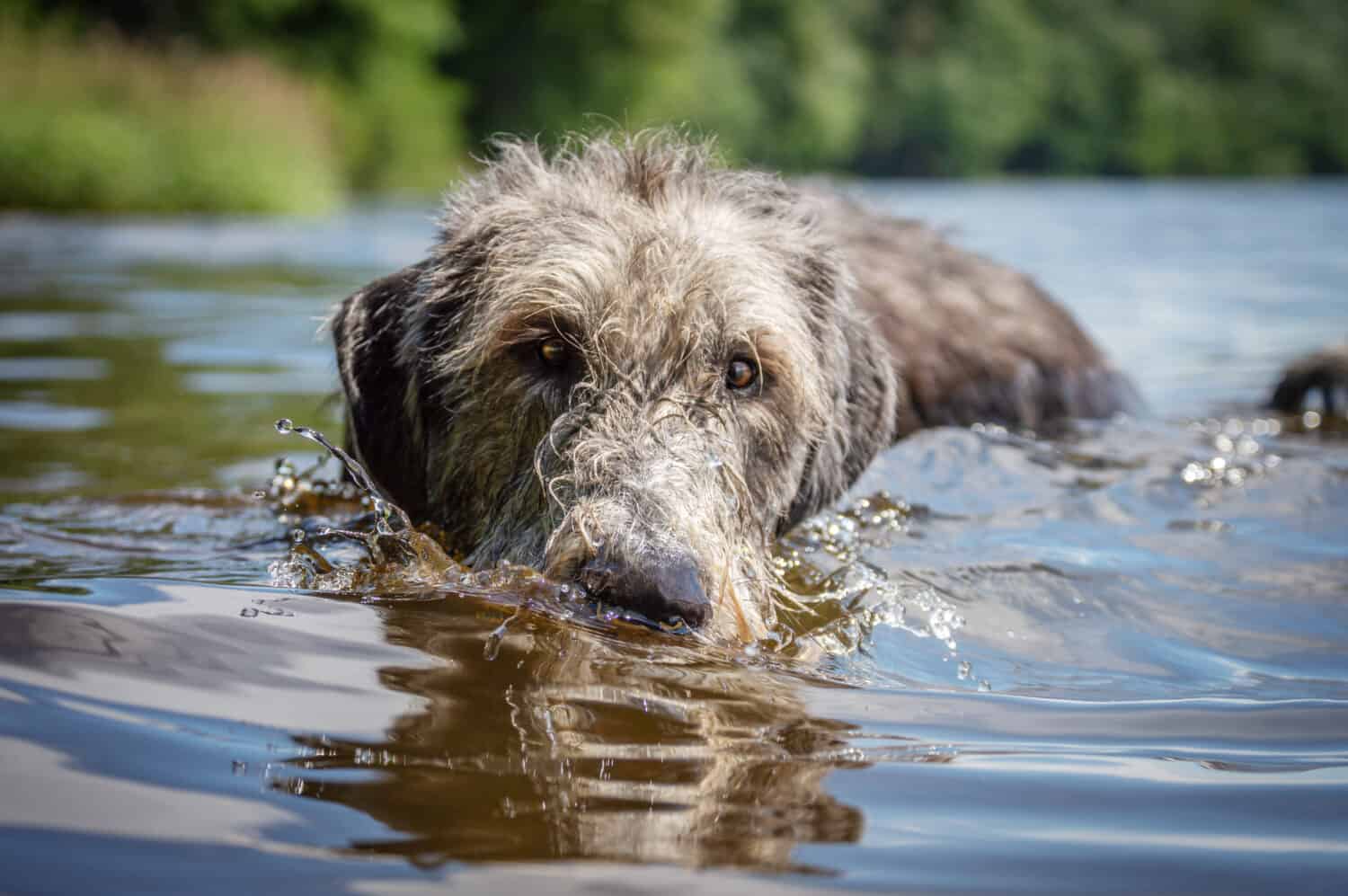
Swimming is a great activity to increase an Irish wolfhound’s lifespan and is easy on the joints.
©84kamila/Shutterstock.com
Exercising an Irish Wolfhound regularly can help keep them fit and healthy, allowing them to live a longer life. This should include daily walks and a variety of activities such as running and play.
Exercising an Irish wolfhound can include activities such as running, hiking, swimming, agility courses, and retrieving games. Taking them to dog parks or other areas with plenty of space for them to run around is also a great way to get them active. As these dogs have a lot of energy, it is important to exercise them regularly so they do not become bored or destructive in the home.
Irish wolfhounds need regular physical activity throughout their lives to stay both mentally and physically fit. Due to their breed, they have a strong prey drive. Let them loose in an area that is protected by a fence, and walk them on a leash. It is helpful for them to have access to a large, enclosed space where they can roam and play. Participating in canine activities, such as tracking, lure coursing, and agility games, can also benefit the breed by exercising both their minds and bodies.
4. Health Care
Just like with human beings, having access to veterinary care increases an Irish wolfhound’s lifespan. Having a regular veterinarian check-up will help your Irish wolfhound stay healthy. This includes vaccinations, parasite prevention, and yearly examinations to ensure they are free of any health conditions or issues. Additionally, these dogs may need extra care depending on their age; for instance, senior dogs may require more frequent vet visits and specialized diets.
Taking good care of a dog is extremely important for their wellness. If any small injury goes untreated, it could worsen and become a bigger issue. Especially for dogs that live outside, they may not have regular contact with humans, and medical problems may go unnoticed until it’s too late. Even something as small as a flea or tick infestation can be dangerous if not addressed quickly.
5. Grooming
Ensuring your Irish wolfhound is groomed correctly can help them reach their maximum life expectancy. This comprises more than just medical attention; it also involves keeping the dog clean and tidy to get rid of mats, excess fur, and anything that may become lodged in their skin or feet.
Irish wolfhounds feature a double coat of a coarse and wiry outer layer combined with a soft undercoat. Although they do shed, it is not excessive. Regular brushing once a week will help keep the dog looking neat and tidy and remove dirt. Unlike other double-coated breeds, Irish wolfhounds don’t go through an intensive shedding season. As with all breeds, it is important to trim their nails regularly as long nails can be uncomfortable for them and make it difficult to walk and run.
Teeth care is incredibly important for dogs because it can affect their overall health. Regular brushing is recommended to prevent tartar and plaque build-up, which can lead to tooth decay and gum disease. If your wolfhound does develop dental issues, it is important to take them to the vet as soon as possible so that they can be addressed quickly and effectively.
6. Irish Wolfhound Lifespan—Environmental Factors
Dogs do not have as much protection from pollutants and toxins. Additionally, since dogs are closer to the ground, they use their noses more often to investigate their world. They also groom themselves with their tongues, allowing them to ingest and absorb more toxins like chemical lawn fertilizers and pesticides. Dogs have their bare paw pads directly on the ground. They can absorb chemicals like insecticides and de-icing agents through their feet.
Those who keep their Irish wolfhounds outdoors are often subjecting them to extra tension from exposure to the environment. This can include severe temperatures and rough weather, such as heavy rain and intense heat. These challenges may cause the dog to age quickly.
7. Mental and Emotional Stimulation
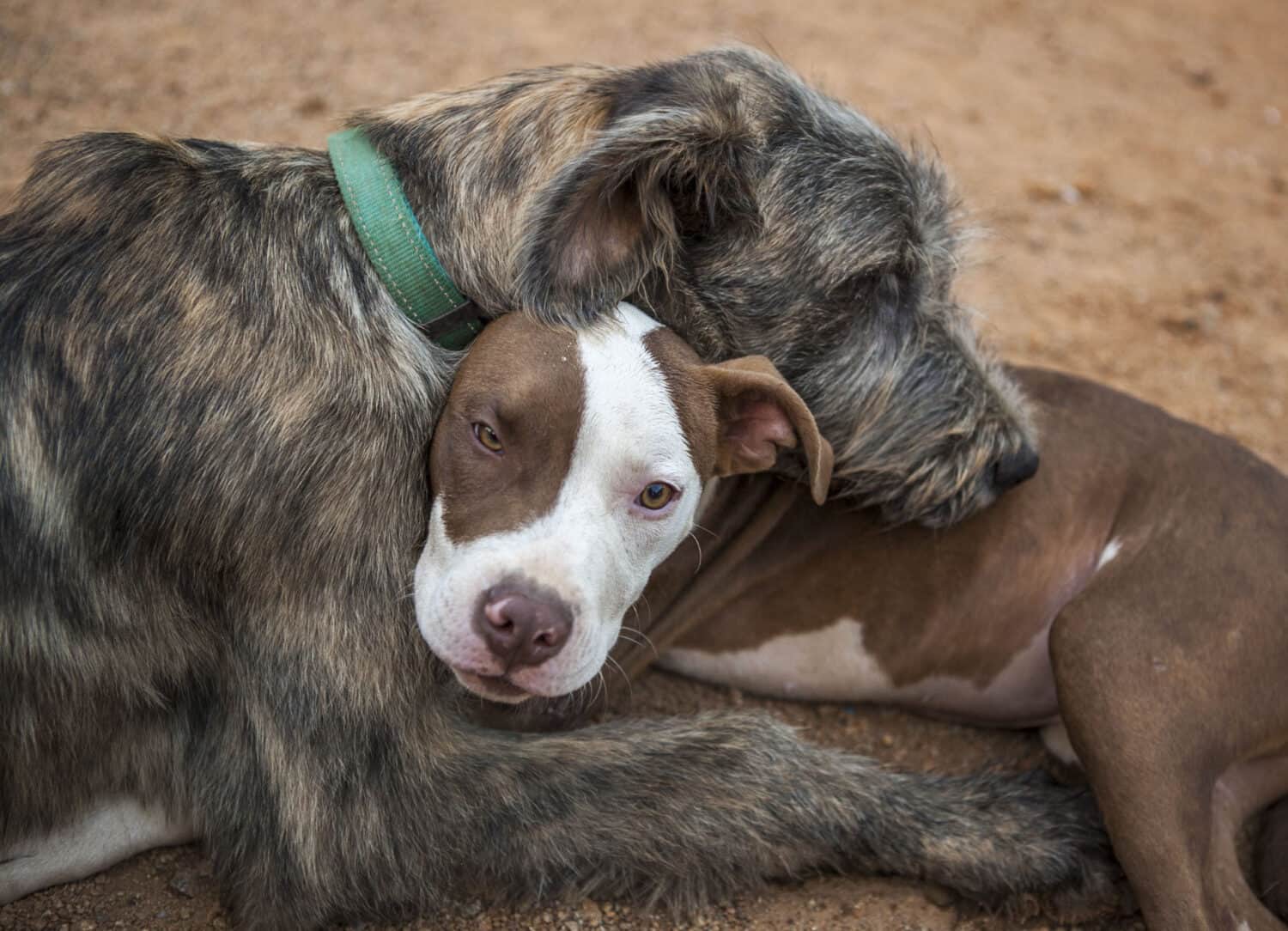
Having strong emotional bonds with other pets or their human companions is an important factor in Irish wolfhound’s lifespan.
©Louise Peck/Shutterstock.com
One factor in an Irish Wolfhound’s lifespan that is often overlooked is their need for a rich mental and emotional life. Just like humans, dogs need to be stimulated mentally and emotionally. This can include activities such as engaging in puzzles or games, going for walks with their owners, playing fetch, learning tricks and commands, and taking part in agility courses. All of these activities help keep them physically fit while also providing mental stimulation that helps to reduce anxiety levels.
It’s important for Irish Wolfhound owners to pay attention to any signs of stress or anxiety so that they can provide the dog with an appropriate environment and adequate mental stimulation. This can include providing them with comfortable bedding, plenty of fresh food and water, access to toys or chewable items for entertainment, and, most importantly, lots of love and affection from their owners. All these things combined will help keep an Irish Wolfhound’s stress levels low, which in turn helps extend their lifespan.
Common Health Issues for Irish Wolfhounds
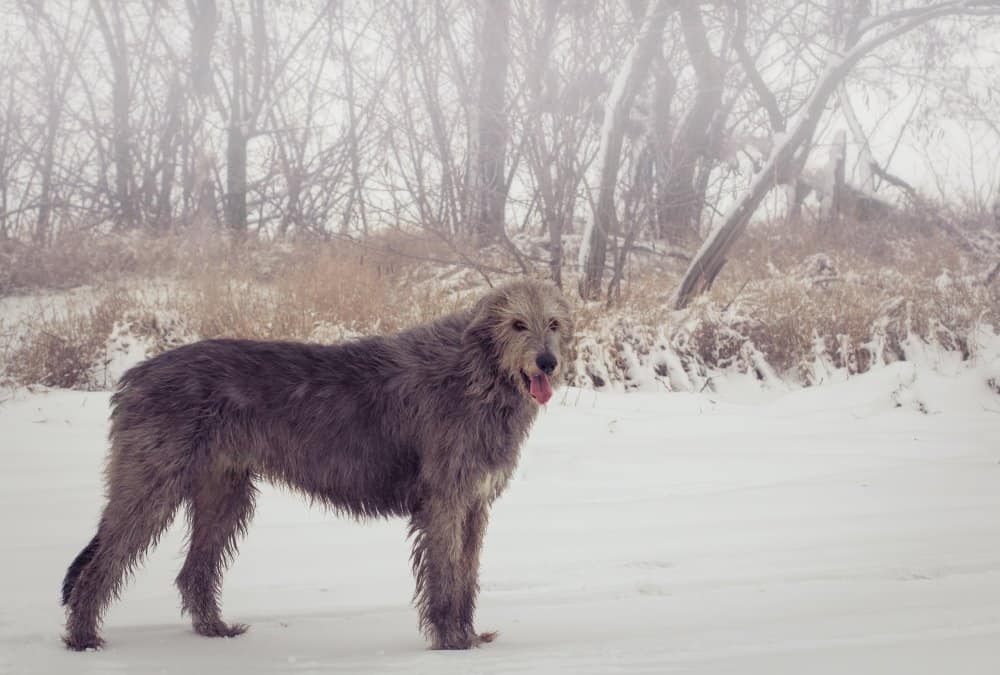
Like all dogs, Irish wolfhound’s lifespan is affected by their genetics and common health issues.
©Olga Salt/Shutterstock.com
Unfortunately, Irish wolfhounds are prone to a variety of health issues, as with any breed. Some of the most common include bone and joint problems such as hip dysplasia, elbow dysplasia, and arthritis; heart conditions like cardiomyopathy; eye disorders such as progressive retinal atrophy (PRA); skin allergies; and bloat or gastric torsion.
It’s important for owners to have their Irish wolfhound checked regularly by a veterinarian in order to identify any issues early on when they are more easily treatable. Vaccinations and regular deworming are also recommended for Irish wolfhounds in order to keep them healthy and safe from common diseases. Additionally, owners should consider investing in pet insurance, which can help cover the cost of treating any illnesses or injuries that may arise in their beloved companion.
The Oldest Irish Wolfhound Ever Recorded
According to the Irish Wolfhound Club of Ireland, a dog named Killykeen Kildevin lived for 16 years and 6 months. He was owned by Anthony Killykeen-Doyle, a breeder in the area. Anthony owned and raised Irish wolfhounds for 55 years and had deep knowledge of their bloodlines. He often took wolfhounds to dog shows and won many awards. Anthony attributed the longevity of his dogs to a fresh food diet of eggs, vegetables, meat, and milk. He did not use commercial dog food. Please be sure to check with your veterinarian before you attempt any diet changes.
The photo featured at the top of this post is © Jagodka/Shutterstock.com
Ready to discover the top 10 cutest dog breeds in the entire world?
How about the fastest dogs, the largest dogs and those that are -- quite frankly -- just the kindest dogs on the planet? Each day, AZ Animals sends out lists just like this to our thousands of email subscribers. And the best part? It's FREE. Join today by entering your email below.
Thank you for reading! Have some feedback for us? Contact the AZ Animals editorial team.






